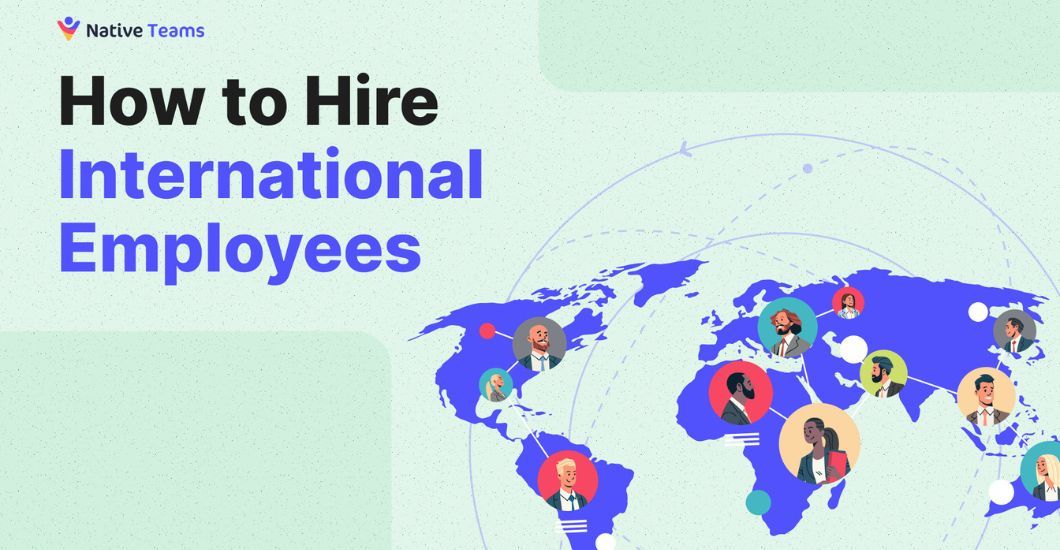Guide to Hiring International Employees in 2025 (Strategies)
Since remote work has gained momentum, the entry barrier into the global talent pool is lower than ever for companies.
And why not take that jump?
International employees bring untold value with new perspectives, energy, and inclusivity. Not to mention increased brand visibility in new territories. However, it can be tricky if companies aren’t familiar with local laws, taxes, and benefits.
This guide will dive into everything you need to know about how to hire international employees, from benefits and challenges to strategies to ensure a smooth onboarding process.

Why hire international employees?
Recruiting international employees boosts the global mobility of businesses and aligns with global mobility trends. In addition, their international knowledge can aid businesses in scaling their radius in terms of innovation and productivity. Here are some of the reasons why businesses should hire international employees.
- Allows companies to reach new markets. Hiring internationally helps businesses to acquaint themselves with cultural differences, such as language barriers and etiquette. This alleviates the friction in the transition to foreign markets without alienating international clients.
- Provides a competitive edge. By hiring internationals, businesses will boost the fostered diversity, which will lead towards greater competitiveness. Having employees from diverse cultural backgrounds is typically a breeding ground for innovations.
- Increases productivity. A distributed team around the globe will make sure work is done and delivered around the clock. Thus, businesses can build credibility among clients with quick turnaround projects and just-in-time requests.
What are the benefits of hiring international employees?
When hiring international employees, businesses diversify their workplace with individuals from various countries. In addition, the recruitment process emphasises the unique skills and knowledge amidst the candidates. This greatly impacts the growth of businesses.
Before we start discussing some of the most prominent benefits of hiring international employees, we invite you to check out the “Global Talent Revolution – Disrupting the Norm” webinar by Synapse and Native Teams. The collaboration between these two leading companies will give you valuable insights into the most important aspects of global hiring – from benefits to cultural and legal challenges and modern solutions.
Welcome to the Synapse and Native Teams Webinar – “Global Talent Revolution: Disrupting the Norm.”
1. Access to international talent
The primary drive behind hiring international employees is to introduce workers with diverse skill sets to the team.
There could be instances where the business’ native country lacks talented workers in specific areas. In such cases, the HR management can consider expanding the search radius across borders to hire international talent with the required skill set.
On the “Global Talent Revolution – Disrupting the Norm” webinar, Cody Sklar, founder and COO of Synapse, talked about the post-COVID talent landscape and how it changed human management in the remote work era.
“We started this business 10 years ago, and the evolution of the talent landscape has been vast since that time. Most companies never considered remote work as an option because they never anticipated the challenges that they might face – how to onboard and retain talent and how to build culture entirely remotely. These are very challenging things to do even today, but obviously, the COVID pandemic has affected the entire talent acquisition landscape.” – Cody Sklar, Synapse.
Cody Sklar also gave his insights on the current difficulties in global talent acquisition and shared a word about the “low-hanging fruit” phenomenon that the talent market experienced after the pandemic.
“Even though there are still a lot of opportunities out there, the talent pool has been fluctuating. All the layoffs that have happened over the last year have produced a lot of really strong candidates, especially in the tech market. When these layoffs happen, you have an influx of amazing candidates all at once, and everyone is trying to hire from that pool. We call this the “low-hanging fruit” – it’s available but only for a very short period of time. Once it “dries up”, the market becomes very cyclical.” – Cody Sklar, Synapse.
Businesses that use a strategic approach can easily secure the best talent that will align with the corresponding job role and provide value in the long run.
2. Reduction in employment costs
An increased profit margin is another benefit of hiring internationally. Businesses can save on costs by hiring in developing countries where employees would get their pay in local currency. This would be a significantly lower amount than the average pay scale in developed countries, leaving organisations with more available resources that can be used more efficiently.
Moreover, employee benefits packages vary across different countries. With proper research and legal support, global employers can offer appealing benefits and fair treatment for international workers while still saving money on wages and benefits.
3. Increased problem-solving capabilities
Onboarding internationals with numerous experiences can aid in developing problem-solving approaches. These employees can present various ways to tackle an issue based on their background and experience. Even senior employees and higher management can benefit from these out-of-the-box solutions.
In addition, diversified views can mitigate any obstacles and help in foreseeing potential roadblocks in the future.
4. Enhances workplace culture
The blending of different perspectives, ideas, and cultures is the best recipe for healthy company culture. So, it’s important to recognise and embrace the cultural practices of all team members.
The higher management should make deliberate efforts to honour everyone’s contributions and beliefs. Employees will feel respected and part of the company’s spirit and culture. This will result in high employee morale, as well as a positive reputation management, thanks to the company culture. Consequently, the turnover rate and employee burnout will greatly decrease. Premium crystal awards can further reinforce this culture by providing elegant and meaningful recognition for outstanding employees.

What are the challenges of hiring international employees?
Hiring international employees comes with undeniable benefits. However, diversifying a business and launching it on the global market can present certain challenges.
It’s essential to be aware of these challenges before opting to hire beyond geographical boundaries.
1. Legal and regulatory compliance
When employing workers from other nations, businesses are required to abide by local payroll regulations, taxes, and labour laws. Failing to comply with these laws and regulations could lead to severe legal consequences, such as monetary fines, lawsuits, and suspension of business licenses.
On the “Global Talent Revolution – Disrupting the Norm” webinar, Marko Belic, the VP of Legal in Native Teams, talked about the law differences from one region to another and the importance of overcoming them while staying adherent to the countries’ unique law frameworks:
“ US employers and employees are used to having at-will termination employment contracts, which means that the contract can be terminated at will. But this type of termination doesn’t exist in Europe, so it’s important to bridge those gaps between people.” – Marko Belic, Native Teams.
However, as the global hiring trend continues to rise, it imposes the need to review and revise individual countries’ labour laws and regulations. This is especially evident after the COVID-19 pandemic and the shift to remote work and work-from-home models, where global employers need to abide by labour laws and rules that are mostly designed to regulate traditional labour operations.
“People started adopting work-from-home massively after COVID-19, and in essence, the benefits outweigh the negatives. But what happened is that labour laws still haven’t changed. Very few countries put work-from-home in a proper framework, and the legal problem is that there’s a lot of grey area. A lot of laws mention working from home as a category, but it usually ends up being one sentence in a whole law. Professionals in this space have a lot of trouble navigating through this grey area. This is the biggest issue we have, and that is probably going to stick around for a while because countries are not rushing to change their labour laws to accommodate it. “ – added Marko.
Businesses are advised to hire legal counsel to ensure full compliance with the local set of rules. HR services like PEO and EOR can offer businesses support in handling admin and compliance tasks so that the focus can remain on scaling the services and products.
2. Different time zones
The time zone differences can have a negative impact on productivity and collaboration. It can be hard to find a convenient time for meetings and working on projects as everyone’s working hours will differ.
Using scheduling tools and setting clear expectations of how they should interact with one another is crucial in managing global teams.
Plus, businesses should establish asynchronous communication via email or other remote work tools for better coordination.
On the “Global Talent Revolution – Disrupting the Norm” webinar, Mia Basheera, COO of Native Teams, shared her insights on how to overcome time zone challenges and nurture cultural diversity while not compromising on productivity and job satisfaction:
“When operating a global team – if you’re going remote, you have to do it right. This means that you need to put in place a clear system for how you run your distributed team. People managers and individual contributors alike are located all over the world, so that system or “terms of engagement” that specifically work for your business needs to be created early on.
For us, those terms of engagement are strong documentation that reinforces the ability to work asynchronously. This removes the time zone ‘sync’ issues. Our teams don’t need to be in the same place at the same time to get things done. The added value is that with our approach, we’re seeing an upward trend in terms of both productivity and well-being.” – Mia Basheera, Native Teams.
3. Cultural differences and communication barriers
Cultural differences in norms and ways of communication can be the root of multiple disparities. Language barriers can also interfere with communication, which will lower work efficiency.
To successfully avoid miscommunication, cultural differences, and other similar barriers, companies can rely on a couple of strategies that enhance cross-cultural communication:
- Providing cultural training to enhance the employees’ understanding of different cultural norms, values, and communication styles. Employers should also educate their global teams about potential cultural misunderstandings and their impact on communication.
- Prioritising active listening by encouraging team members to listen attentively, ask clarifying questions, and seek constructive feedback to ensure better understanding. This will promote a culture where individuals feel comfortable to express their concerns and ask for clarification.
- Promoting clear and consistent communication through regular meetings, feedback sessions, and updates. This can be done with the help of technology and remote work tools for communication.
Providing cultural training can ease the integration process of international employees into the business’ working and cultural environment, while active listening and straightforward communication also help detect misunderstandings and conflicts before they escalate.
4. Legal entity registration
Employing multinational workers demands the business to register a legal entity in that particular country. Businesses might find this daunting due to the risk of compliance.
To overcome the administrative and compliance hassles of international hiring, companies like Native Teams can help global employers in 2 ways:
- Become the employer of record of the business client and hire employees on their behalf in a specific country. This means that companies don’t need to set up a legal entity in the country where they want to expand to hire talent.
- Provide a legal entity setup on behalf of the business client. Native Teams can help you set up your UK legal entity where you can utilise tax reliefs and incentives while still being able to hire through Native Teams’ entities in 65+ countries.
Legal entity registration imposes a lot of administrative tasks and requires legal expertise to stay compliant with the country’s laws. Hence, it’s recommended to rely on professional services to avoid legal issues.
Basic strategies for hiring international employees
Establishing a global strategy when hiring employees in more than one country can help businesses handle difficult situations tactically. Here are some strategies businesses can implement that could be deciding factors in their global expansion.
1. Set up a legal entity for your business in the country where you want to hire employees
Opening international offices creates an image of commitment to becoming a part of the local market. It builds trust among the local business community; therefore, brand awareness increases.
In addition, the business’s current staff will have the opportunity to relocate to a new location and gain international experience.
However, entering a new market with a legal entity requires investment in time and capital. So, it’s important to do proper research on things needed for an office in a foreign country.
2. Contact a professional employer organisation (PEO)
Once a business has set up a legal entity in a new location, the legal requirements and administrative tasks for the local employees will continue to add up.
Businesses can outsource HR-related tasks, like payroll management, legal compliance, and benefits packages, to professional employer organisation (PEO) to free up time and resources.
PEO providers will take on the burden of handling the never-ending red tape and improve overall work efficiency.
3. Work with an employer of record (EOR)
Hiring international employees through an employer of record (EOR) provider is the fastest and most cost-effective method. For businesses that don’t own a legal entity in other countries, the EOR can hire international employees on the businesses’ behalf.
The other advantage is that businesses don’t have to hire HR management, legal counsel, and compliance experts — EORs manage all of those duties.
Moreover, EORs remain liable for any compliance risks when hiring abroad because they function as the legal employer of the local employees.
4. Hire international contractors to work on specific projects or for specific time periods
Working with independent contractors is crucial for businesses that necessitate specific skills that aren’t available in their native country.
International contractors typically don’t have the full set of entitlements as regular employees, meaning that businesses can reduce overhead costs. Nowadays, businesses can easily hire, onboard, and pay international contractors with the help of companies like Native Teams, and their all-in-one contractor solutions.

Common mistakes in hiring international employees
By investing time in thoroughly understanding the in-country laws and regulations, businesses can sidestep these obstacles and avoid fines and penalties. Here are some of the common mistakes when hiring international employees.
1. Misclassifying employees
When hiring international employees, one common mistake is the misclassification of their employment status.
If a business pays a fixed amount on a regular basis and has full access to their working schedule, the person is deemed as an employee. This means that the business is required to pay contributions and provide benefits to that employee.
2. Violating the new country’s laws
Employment and labour laws differ across countries. Therefore, businesses need to gather information on notice period durations, create employment contracts, and follow the rules around labour laws.
In addition, social and benefits deductions need to be considered. Some countries have strict rules when it comes to social deductions, insurance, and retirement plans.
3. Incorrect payroll calculations
Executing compliant payroll calculations can be highly complex. When employing internationals, businesses are expected to run a local payroll because international employees can’t be added to the home payroll. One small miscalculation or lack of contribution can affect the employee’s take-home pay. Payroll calculators provide a full salary breakdown in the countries in which businesses want to hire.
Tips on hiring international employees
Growth-minded businesses should follow a deliberate recruitment process to attract professionals with the highest expertise. Below we cover some tips that can be utilised for hiring international employees.
1. Determine the hiring status
An important first step is to determine the hiring status — as an employee or contractor. Hiring contractors might seem simple, but it could lead to issues if due diligence isn’t done based on the local employment rules.
International employees provide more stability; however, businesses could be required to establish a legal entity to start hiring.
It’s essential to make this distinction at the beginning of the process to avoid misclassification.
2. Network and acquire referrals
To ensure the right international talent for a certain position, acquiring referrals from trusted sources can aid in such a search.
Asking for recommendations from local businesses in the same industry or current employees who have global networks can be more beneficial than posting a job post.
As a result, the credibility of the business around the world will improve while increasing the business’s talent pool.
3. Review the legal requirements
Expanding in countries that have a low tolerance for lack of compliance means it’s imperative to execute error-free payroll and full compliance.
Streamlining payroll management with automation tools can centralise the system and minimise the burden that comes with global compliance.
On top of this, it’s vital to stay abreast with the newest changes related to labour laws and payroll regulations to avoid legal issues.
4. Develop an onboarding plan
A positive onboarding experience leads to increased employee retention. Developing an onboarding plan will help the new employee to learn the ins and outs of the team and integrate faster.
The onboarding plan can entail personalised welcome messages and internal training to familiarise them with the forms of communication and team members.
The team management should also explain role-specific expectations and assign manageable initial projects.

To sum up
International employees can immensely diversify a business’ workforce and provide fresh experiences and perspectives. By following our insights, strategies, and tips, businesses can recruit foreign workers without worrying about legal compliance!
